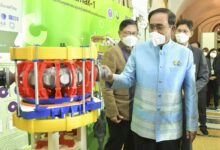Chiang Mai residents sue govt over perpetual air pollution crisis

Residents in Chiang Mai are suing the Government of Thailand for years of neglect in failing to tackle the region’s perpetual air pollution problem.
Yesterday, about 1,700 Chiang Mai residents filed a lawsuit in the Administrative Court against Prime Minister Prayut Chan-o-cha and two state agencies for their failure to address the annual dense smog that blankets the region.
The plaintiffs claim that this smog is causing a reduction in their lifespans by approximately five years. About 60 people gathered at the Administrative Court in the northern province to initiate legal proceedings against PM Prayut, the National Environmental Board, and the Securities and Exchange Commission.
They are alleging that these entities have neglected their duty to use their power to resolve the smog issue in North Thailand.
The class action lawsuit brought by around 1,700 plaintiffs comprises individuals from various groups, including northern people’s networks, activists, academics from Chiang Mai University, and residents, reported Bangkok Post.
Over three days from Friday to Sunday last week, 727 people showed their support for the lawsuit by signing their names at the faculty of law at Chiang Mai University, while approximately 980 individuals did so online.
The plaintiffs identified contract farming as the primary cause of severe air pollution.
Sumitchai Hatthasan, director of the Centre for Protection and Revival of Local Community Rights and one of the plaintiffs, stated that the prime minister has not fully utilised his power under the Enhancement and Conservation of National Environmental Quality Act to address the issue.
The plaintiffs accused the National Environmental Board of failing to effectively implement the national plan introduced in 2019 to tackle particulate matter pollution. Additionally, the Securities and Exchange Commission has been held accountable for neglecting to investigate the sources of ultrafine dust pollution within the supply chains of major listed companies, which could have helped to address the problem.
According to Dr Rangsarit Kanchanawanit, a faculty member of the medicine department at Chiang Mai University, people living in urban areas are experiencing negative health impacts due to consistently high levels of particulate matter 2.5 micrometres in diameter or less (PM2.5) throughout the year. This pollution increases the likelihood of developing lung cancer, heart disease, and stroke, and is estimated to shorten the lifespan of affected individuals by 4-5 years.
He said…
“We want to see the government change its policies, to show a strong political will and not just be considerate towards capitalist groups. This could save millions of people from illness.”
Chatchawal Thongdeelert, a member of the Breath Council, pointed out that the issue of PM2.5 has been worsening every year. As a result, the government must implement both short-term and long-term measures to address air pollution and reduce its impact on public health. Chatchawal said…
“The root cause is burning, both in forests and on maize plantations… Political parties and the new government must prioritise this issue and have effective solutions.”
There have been precedents set in the past where activists have successfully sued the Thai government.
In 2013, a group of factory workers in Thailand won a case against the government for failing to protect workers’ rights.
In 2017, a group of fishermen won a case against the government for failing to protect their rights to fish in Thai waters. In 2018, a group of villagers won a case against the government for failing to provide them with access to clean water.
Latest Thailand News
Follow The Thaiger on Google News:


























